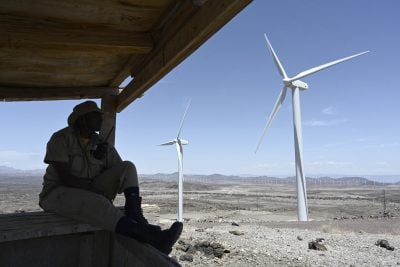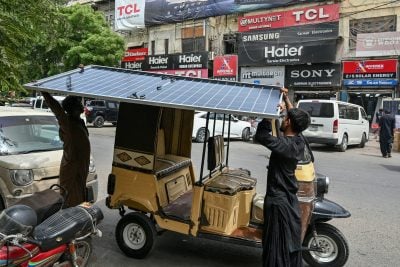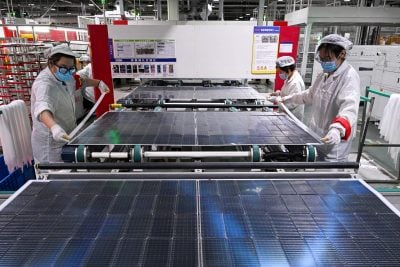A tragic shared history, bitter political animosity and an ongoing refugee crisis have left relations between Rwanda and Burundi among the most fragile in East Africa. Yet despite back-and-forth claims of underhand military activity and a presidential relationship in the deep freeze, a visit to a joint border post reveals an unlikely model of peaceful cooperation.
Uniformed officials from both countries sit cheek-by-jowl in newly built offices, passing visa applications to their opposite numbers for rapid approval. Gone is the chaos of the typical African border post – the familiar traffic jams and hawkers’ cries replaced by the patient queuing of visitors and the unhurried loading of a goods truck.
The political conflict in Burundi has decimated trade revenues, and the modest flows that pass across this border account for less than 3% of Rwandan exports. Yet the border post offers a tantalising vision of how the East African Community (EAC) might unlock billions of dollars in trade. No longer will citizens be subject to the bureaucratic nightmare of endless paperwork, petty bribery and day-long queues.
For Rwanda, a landlocked nation of nearly 12m with ambitions of becoming a regional hub, overhauling the network of border posts is essential to encouraging closer union with its regional partners and achieving its development goals.
“We understand that it will not be possible to reach our economic objectives and targets, to get to the level of middle income country that we want to get to, if we are not part of a much bigger entity,” Valentine Rugwabiza, Rwanda’s minister for the EAC, tells African Business in her Kigali office.
A recent survey of the region’s integration efforts suggest that policymakers are getting the message. According to the Africa Regional Integration Index Report 2016, the EAC is now the most integrated community on the continent, having accelerated the glacial pace of cross-border trade. Take journey times between the Kenyan port of Mombasa and Kigali, Rwanda’s capital. A trip which previously took 21 days has been reduced to five, while the cost of a shipping container fell by 19% in 2014 alone.
Rwanda itself has hoovered up some of the plaudits – the report ranked the country first in the region for financial integration and joint first for the free movement of people. But despite progress towards a common market – as well as the the buoyant rhetoric of politicians – the country still lags when it comes to harmonised trade policy with its neighbours and the integration of infrastructure. For Rugwabiza, some policymakers across the region are putting personal interests ahead of the common good.
“The real challenge has to do with perception in the mindset of some of the governments. People in government still tend to see regional integration as a zero-sum game – if I win, a neighbouring country is losing. Clearly that’s not the case – everyone wins or we lose together,” she says.
The minister says that this one-upmanship has undermined the progress promised by an encouraging reform agenda. Governments, she says, must put self-interest aside in order to work together to build value chains. A good start would be an admission that neighbouring states are sometimes better poised to benefit in certain sectors.
“If Uganda is better than Rwanda at certain things, so be it. We can start developing regional supply chains … There’s no way we’re going to reach the level we’re looking at without coming together. Our markets are simply too small, they will not allow the economies of scale.”

Go forth and trade
For the policymakers and functionaries that staff the EAC’s headquarters in Arusha, Tanzania, such appeals to mutual interest might appear obvious. Yet for Rwandan businesses, engaged in the hardscrabble battle for market share, navigating a brave new world of 170m consumers will take some getting used to.
While many have begun to benefit from the fruits of EAC integration, including a wider export market and cheaper inputs, it is clear that for a majority the region is still a step into the unknown. Few are prepared to cast off from their home nation, a safe harbour that registered 6.9% growth last year while the wider region suffered the effects of a commodity-led downturn.
“We still have work to do to convince Rwandans to go and do business beyond Rwanda,” says Rugwabiza. Citizens feel comfortable at home yet there is a size and level of development of business that they cannot reach focusing only on the local market.”
One way of convincing businesses would be a sustained effort to improve the battered infrastructure that underpins regional trade. Potholed roads and Victorian railways are out – multibillion-dollar prestige projects are the future. The Mombasa-Kampala-Kigali railway, an 1,800-mile Chinese-funded link through the EAC’s Northern Corridor, offers a rare example of joined-up thinking. Expected to be completed by 2018, it will allow Rwandan businesses much quicker access to the neighbouring markets of Kenya and Tanzania. Rwanda is hoping to make similar headway on projects to encourage internet connectivity and improved air links.
But if the mega-projects are to get off the ground – including ambitious schemes centred on the previously dormant Central Corridor comprising Burundi, the DRC, Uganda and Tanzania – policymakers will have to grasp the nettle of funding. With projects on ice due to the commodities slump, local press have gone as far as to suggest that the EAC’s secretariat is struggling to gather operational funds from member states. Rugwabiza denies this, but says that the secretariat – whose donor-funded budget reached $111m last year – will mainly act as facilitator. As ever, crowding in the private sector is the name of the game.
“If we speak of projects to the value of a few billion US dollars, we know even all the governments coming together and contributing will not be able to fund such projects. So we are arranging partnerships that will make them more commercially attractive and able to attract private money”.
Ultimately, says Rubwabiza, it is the trickle-down progress from the largest projects that is giving EAC citizens a greater stake in the community. She hopes that Rwanda is leading by example.
“You can’t spend days here without noticing the number of Ugandans, Burundians and Tanzanians – it’s a reality. They realise that if the business environment is conducive here in such a small territory, surely it is possible for their own countries to open to other East Africans”.
David Thomas
Want to continue reading? Subscribe today.
You've read all your free articles for this month! Subscribe now to enjoy full access to our content.
Digital Monthly
£8.00 / month
Receive full unlimited access to our articles, opinions, podcasts and more.
Digital Yearly
£70.00 / year
Our best value offer - save £26 and gain access to all of our digital content for an entire year!
 Sign in with Google
Sign in with Google 



